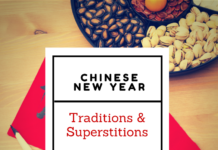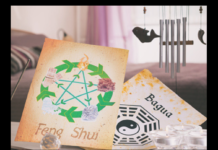We have been sharing New Years Traditions & Superstitions from around the world for years. We have shared everything from lucky colors, scents and plants, to Feng Shui Good Luck Tips, but this year we received several questions on New Years Eve that we had never been asked, so we did our research and here are answers to some….
Unusual questions about New Years Even Superstitions we received on December 31st
- Should I put coins outside on New Years Eve?
So we found a few variations of this superstition. The first is that you should place loose change on every window sill and entrance to your home before midnight on NYE to guarantee money for the coming year. This is said to have started in Scotland. In a similar custom from Germany, people place a quarter or other silver coin under the doormat before midnight. The next morning you bring the quarter back in. This again should bring financial stability in the new year.
Another version of this is to bury money on New Years Eve while saying that you are burying any misfortune. Then, dig it up on New Years day, as you say “I am uncovering my wealth and good fortune.”
While on the subject of coins, we thought we’d share a few others things we came across.
In Poland, coins are placed in water and people rinse their face with this water (dirty coins don’t sound appealing….not one I will be trying.)
In Belgium, for dinner on New Years Eve, Belgians bring luck in by placing a single coin under each plate.
In Russia superstition states “money goes to money,” so they scatter coins in bags and cupboards around the home to attract more money.
- Should I put bread outside on New Years Eve?
In Ireland, it is a new years tradition to bang loaves of bread on doors and walls to chase out any bad luck and invite good luck in. In the past, it is said they place bread outside the front door to symbolize an absence of hunger in the home in the coming year. What to do with all of the bread? New Years day is also known as Day of the Buttered Bread in Ireland.
In some households they put both bread and money on the table, to ensure they will have enough food and funds in the coming year.
In Scotland, a lot is expected of a first visitor into the home on New Years day. They are supposed to bring good luck gifts of coal (yes coal,) bread, whiskey & a coin. They also have to say the following “A happy New Year and good tidings to you and yours!” In England they expect salt, coal and bread. This means that the following year everyone in the home will have enough to eat (bread), enough money (salt) and be warm enough (coal). As to the whiskey the Scottish expect, we can only assume that means good times in the coming year.
- Are onions good luck on New Years Eve?
In Greece, many people do hang onions by the door. Some go as far as tapping onions on children’s heads at midnight. The onion hold special importance for Greeks as its considered to represent growth, rebirth and fertility. This comes from the fact that bulbs sprout eager to put down roots and grow. With the theory that round foods represent the year coming full circle, & eating root vegetables can help bring balance & good energy, onions also fall under these New Years lucky foods category.
- Are potatoes under the bed good luck on New Years Eve?
In both Peru and Columbia there is a unique custom of having 3 potatoes. One is left unpeeled, one is half peeled and one is completely peeled and you place them under the bed. The next morning without looking, you reach under the bed and grab the first potato that makes contact with your hand. If you get the completely peeled potato, it means you will have significant financial struggles (the word “pelado” in Spanish can mean peeled, naked, bald or broke.) If you grab the half peeled potato it means some economic troubles lie ahead and if you grab the whole potato that means money is in your future.
- Hiding under the table on New Years Eve?
So this is not a NYE tradition, but we did find reference to it. In France since the 14th century, they bake a cake (Gateau de l’egalite,”) on January 6th to mark the Feast of the Three Kings. The cake has a charm, known as “feve,” baked inside. The person who discovers the fève in their serving is declared the king (le roi,) or the queen (la reine) and gets to wear the golden paper crown (couronne) that comes with cake. To avoid any cheating, the youngest child in the house has to hide under the table and tell whoever is cutting the cake who gets each piece.
- Can I wash my hair on New Years Eve?
In the Chinese culture, cutting or washing your hair is forbidden on New Years. New Year’s Eve is fine…it’s actually the time you are supposed to clean your house & get things in order before the start of the new year. Some people take it a step further and do not wash laundry or dishes on New Year’s day, as to not wash away any luck from the new year. Read more about Chinese New Years Traditions & Superstitions.
Do you have any other questions about New Years folklore? If so, we’d love to hear from you.
If you are interested in Superstitions, we have plenty of blog posts for you to read related to Super Bowl, holidays, Friday the 13th and more.
Strange Superstitions Around the World
Friday the 13th Bad Luck Superstitions
St. Patrick’s Day Superstitions
Super Bowl Traditions & Superstitions
Christmas Superstitions








